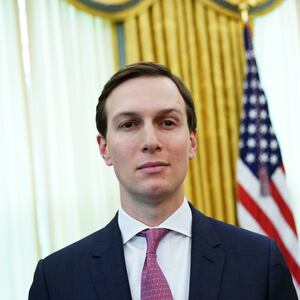Whatever Donald Trump intended with his surprise announcement of “a historical peace agreement” between Israel and the United Arab Emirates, he got his friend Benjamin Netanyahu out of a bind.
Netanyahu, Israel’s longest-serving prime minister, is on trial for bribery, fraud, and breach of trust. In the past year, Netanyahu failed during three successive elections to gain a governing majority, and is now saddled with a lumbering power-sharing agreement with his former rival, the centrist Benny Gantz.
His initial success in steering Israel through the COVID-19 crisis unraveled into one of the worst outcomes on earth. Israeli school re-openings proved a disaster. And he has watched with growing frustration as Israeli streets have swelled with a social protest movement whose single aim is to force him to resign.
ADVERTISEMENT
Netanyahu has also found himself unexpectedly abandoned by some of his staunchest traditional allies, leaders of Jewish settlements in the occupied West Bank, who have balked at endorsing Trump’s peace plan because includes a provision for a future Palestinian state.
So any respite, especially in the form of a gift from Donald Trump, was welcome.
Trump touted the deal as “HUGE.”
Netanyahu, in an informal video posted after making his own televised proclamation, described the UAE agreement a more important achievement than Israel’s 1979 peace accord with Egypt, which was brokered by President Jimmy Carter, and the Israeli-Jordanian peace agreement of 1994, shepherded by President Clinton, each of which ended three decades of war.
It is “a full, formal peace deal with a very important Arab country,” Netanyahu declared, for which Israel is not obliged to withdraw from any territory or do other “dangerous things.”
“We’re bringing peace through strength!” he said, asserting that as his credo.
Abu Dhabi, the Emirati capital, is more than 1600 miles away from Jerusalem, and the two nations have never fought a war, but some exultation was expected as, after 72 years, the first Arab country other than Egypt and Jordan recognized Israel’s right to exist.
But the joint statement issued by Trump, Netanyahu and Emirati Crown Prince Mohammed bin Zayed falls far short of a full peace agreement.
Its only concrete pledge is that “the United Arab Emirates and Israel will immediately expand and accelerate cooperation regarding the treatment of and the development of a vaccine for the coronavirus.”
Otherwise, the document guarantees only that delegations from each country “will meet in the coming weeks to sign bilateral agreements regarding investment, tourism, direct flights, security, telecommunications, technology, energy, healthcare, culture, the environment, the establishment of reciprocal embassies, and other areas of mutual benefit.”
The promise of numerous small, specific accords does not guarantee a comprehensive peace deal, and while Trump said there would be a signing ceremony in the White House within weeks, “a few weeks” in the parlance of the Middle East, can mean a very long time.
“In the Middle East, never assume the promise of future success is equivalent to actual success,” retired Gen. Yaakov Amidror, Netanyahu’s former National Security Advisor, warned in an interview in which he lauded the establishment of diplomatic ties with the UAE as “Netanyahu masterfully turning lemons into lemonade.”
Moreover, the declaration exacted a painful concession from Netanyahu, who since 2015 has promised his right-wing base he’d annex all or parts of the occupied West Bank—and never more so than throughout the electoral campaigns of 2019-2020, in which he leveraged his close alliance with Trump to assure voters the move would be made by July 1.
The document could not be clearer. “Israel will suspend declaring sovereignty over areas outlined in the President’s Vision for Peace,” it begins, and instead will “focus its efforts now on expanding ties with other countries in the Arab and Muslim world.”
As hard as Netanyahu labored on Thursday to assure his voters that “there is no change in my plan to impose our sovereignty over Judea and Samaria”— the biblical names for the West Bank—his disaffected former supporters weren’t having it.
“Netanyahu proves once again that he is not the leader of the rightwing camp, and it seems that there is no choice but to replace him with a nationalist leader with an ideological backbone,” said the Sovereignty Movement, a group representing Jewish settlers in the West Bank, in a statement.
Neither was President Trump, who in a White House briefing starkly contradicted Netanyahu. “Israel agreed not to annex parts of the West Bank. It is more than taking it off the table—they agreed not to do it. This is a very smart concession by Israel.”
“He never imagined the right wing wouldn’t support the Trump plan,” Amidror said, “Given this reality, the prime minister didn’t proceed ahead with a controversial policy that could have ripped apart Israeli society. Instead, he did the right thing—he leveraged it to do something that is unequivocally good for Israel.”
Amidror dismissed the possibility Trump may have acted to merely support Netanyahu as his coalition teeters. Referring to the massive social protest movement, Amidror said “if we are close to elections, Mr. Netanyahu’s problem will not be the Middle East, it’ll be the middle class.”
For the United Arab Emirates, it may have been a matter of keeping its word. On June 12, with Netanyahu’s annexation deadline looming, Yousef Al Otaiba, the Emirati ambassador to the United States published a remarkable vow in Hebrew, telling Israelis “its annexation or normalization. You choose.”
Bahrain, another Persian Gulf power, which according to leaks by Israeli officials could become the next country to normalize ties with Israel, used the occasion to troll Netanyahu without mentioning his or his country’s name in a Tweet stating, “#Bahrain congratulates #UAE, commends suspension of Palestinian territories annexation as a step towards peace in the Middle East.”
Similarly, the Jordanian government said that only “if Israel will use this to advance towards ending the occupation will the region advance towards a just peace.”
More diplomatically, Dan Shapiro, the former U.S. Ambassador to Israel, expressed the hope that the announcement would aid in “restoring U.S. leadership toward a credible two-state outcome that ensures Israel's security and its democratic future, and fulfills Palestinian rights to dignity and self-determination in a state of their own.”
Across the board, most Israeli politicians offered cautious congratulations for the plan, but Ayman Odeh, chairman of the majority-Arab Joint List party, tweeted that “Agreements are made between politicians, but peace is made between peoples.”
“As long as Israel continues to control millions of Palestinians in the occupied territories,” he said, “illusions of peace will continue to be celebrated on foreign lawns while reality here in Israel still requires fixing.”
As at every other junction of Trump’s efforts to attain Middle East peace since his plan was announced last January, the Palestinians—Israel’s ostensible partners for ending the entrenched conflict—were left out of the deliberations.
In a fiery address on Palestine TV, Nabil Abu Rudeinah, the spokesman for Palestinian President Mahmoud Abbas, said his government “rejects what the United Arab Emirates has done and considers it a betrayal of Jerusalem, the Al-Aqsa Mosque and the Palestinian cause.”
“Neither the Emirates nor any other party has the right to speak on behalf of the Palestinian people.”
Oded Revivi, the mayor of Efrat, one of the biggest West Bank settlements and a Netanyahu ally who accompanied him to Washington last January for the presentation of Trump’s “Deal of the Century,” was sanguine.
Underscoring that recognition by Arab nations “is no less important to me than sovereignty over Judea and Samaria,” Revivi said “Regarding Trump’s peace plan, the last word has yet to be said. He has three months before the elections. Of course, we have no idea where Israel is regarding elections, but a lot can happen in three months. We may still be surprised as we were today.”






